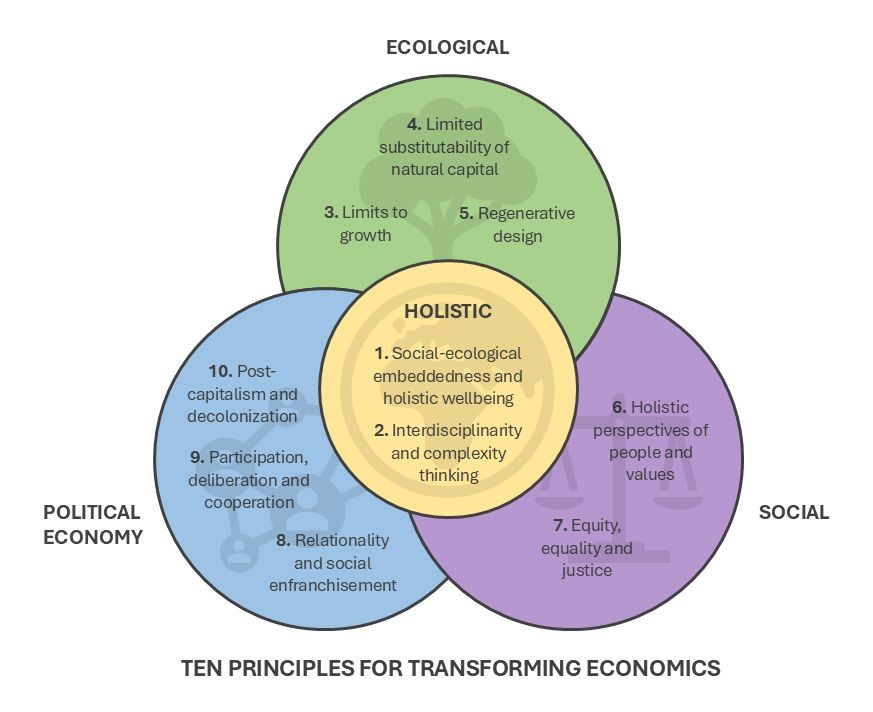Hutton social scientist contributes to report on how to tackle global ‘polycrisis’
A Hutton researcher has contributed to a report which lays out ten guiding principles to tackle the ‘polycrisis’ facing the world.
Dr Simone Martino, a senior researcher with the SEGS Department, joined a team of international collaborators from as far afield as Kenya, Australia, India and Canada to develop the study. Led by Professor Jasper Kenter, University of Aberystwyth, the researchers put forward ten principles to tackle the ‘polycrisis’ – a combined name for the multitude of current crises, from climate change and biodiversity loss to economic inequality, the ongoing impacts of Covid-19 and geopolitical instability.
The principles are an open critique of the traditional focus on GDP growth and efficiency, which often overlooks social equity, ecological limits, and long-term sustainability. By foregrounding pluralism, justice, care work, and ecological integrity, these principles invite a shift from economics as market-cantered discipline to one deeply intertwined with ethics, democracy, and planetary health.

The principles, cutting across 38 economic approaches, are:
- 1- Social-ecological embeddedness and holistic wellbeing: Recognise economies as embedded within societies and ecosystems, prioritising wellbeing for all.
- 2- Interdisciplinarity and complexity thinking: Address economic challenges through diverse, interdisciplinary perspectives, including Indigenous and local knowledge systems.
- 3- Limits to growth: Acknowledge the biophysical and biochemical boundaries of economic activity, shifting away from growth-driven models.
- 4- Limited substitutability of natural capital: Emphasise the irreplaceable role of natural resources in supporting human and economic systems.
- 5- Regenerative design: Foster circular, restorative systems that enhance resilience and resource efficiency.
- 6- Holistic perspectives of people and values: Redefine human motivations and values within economic models, moving beyond outdated self-interest narratives.
- 7- Equity, equality, and justice: Centre fairness in economic inquiry, addressing global inequalities and advocating for marginalized communities.
- 8- Relationality and social enfranchisement: Promote community empowerment, inclusion, and collective wellbeing.
- 9- Participation, deliberation and cooperation: Embed participatory governance as a core element of economic policymaking.
- 10- Post-capitalism and decolonisation: Explore alternative frameworks beyond capitalism and colonial systems, focusing on global equity.
The study’s authors surveyed experts from all over the world and conducted close analysis of 238 different sources before outlining the principles, which aim to shift the emphasis away from market forces and towards the wider wellbeing of the planet.
Dr Martino said: “We need to recognise the value of intangible, unmarked and fundamental services such as care work, community cooperation and informal economies that are generally overlooked in traditional GDP-focused measures.
“While some may view these principles as idealistic or difficult to implement, their value lies in setting a clear direction for reform. The ten principles are a lighthouse for new generations of researchers, practitioners and policy makers who want to take a deep dive into a more just and fair society where markets can take democratic decisions based on collaborative models, and economies are embedded in society and nature.”
The full study is available at: Ten principles for transforming economics in a time of global crises | Nature Sustainability
Blog by:
Simone Martino
Senior Researcher in Valuing Natural Capital
Based in Aberdeen
T: +44 (0)344 928 5428 (*)
Simone has a multidisciplinary background that embraces scientific, social and economic aspects of natural resources and ecosystems, addressing the valuation of ecosystem services (in the marine and terrestrial environment), and implications for policy, governance and resource management. Simone’s research addresses both ecological and natural aspects of resource valuation by coupling ecological and economic models and contributing to discover trade-offs or win-win between users through deliberative approaches. Economic strategies for the management of resources are oriented to the implementation of markets mechanisms to protect natural capital and facilitate generation of public goods provided by ecosystems like beaches, saltmarshes, peatlands and forests. Simone has matured experience as research and teaching fellow in environmental economics and marine resource economics in Italy (University of Tuscia) and the UK (National Oceanography Centre Southampton; Scottish Association for Marine Science; University of York), and in NGOs as ecosystem services officer at the Environmental Markets team of Fauna & Flora International (UK).
Disclaimer: The views expressed in this blog post are the views of the author, and not an official position of the institute or funder.
